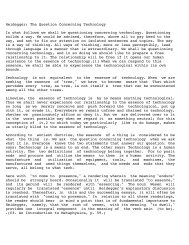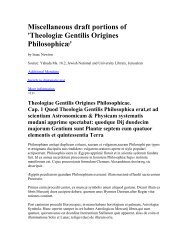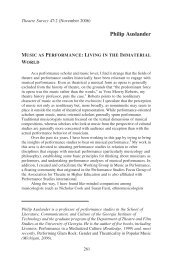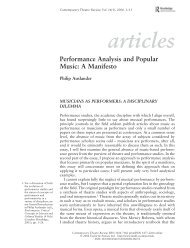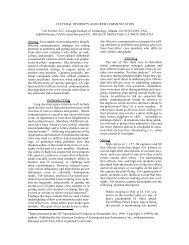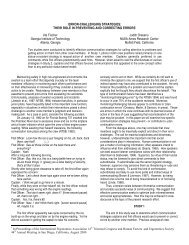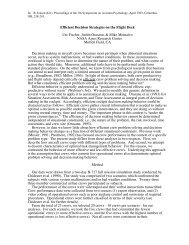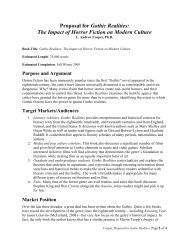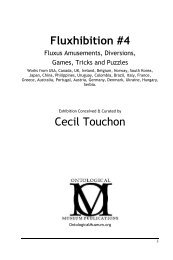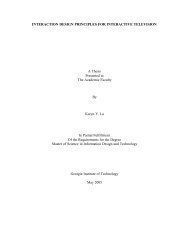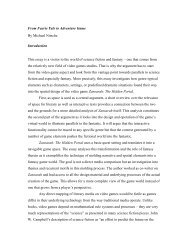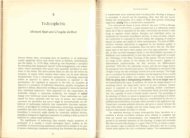william t. costello, sj - The School of Literature, Communication, and ...
william t. costello, sj - The School of Literature, Communication, and ...
william t. costello, sj - The School of Literature, Communication, and ...
Create successful ePaper yourself
Turn your PDF publications into a flip-book with our unique Google optimized e-Paper software.
PROLOGUE<br />
In the year <strong>of</strong> our Lord, 1600, when Elizabeth I was reigning<br />
<strong>and</strong> waning upon the throne <strong>of</strong> Engl<strong>and</strong>, when Shakespeare was<br />
mulling over Hamlet, <strong>and</strong> when Jacobean pessimism, at least according<br />
to later weather analysts, was the forecast for the London<br />
area <strong>and</strong> Southeast Engl<strong>and</strong> (with light to moderate hopes <strong>of</strong> a<br />
brave new world), the university at Cambridge snuggled comfort-<br />
ably along the Cam as she had since the far-<strong>of</strong>f days <strong>of</strong> Henry III.<br />
At the beginning <strong>of</strong> the seventeenth century, Cambridge could<br />
not have thought <strong>of</strong> herself as medieval, for everything she was<br />
<strong>and</strong> taught was part <strong>and</strong> parcel <strong>of</strong> a way <strong>of</strong> thinking <strong>and</strong> living<br />
that had been going on for centuries. By 1600, <strong>of</strong> course, the Reformation<br />
was a fact in Engl<strong>and</strong>, but the trouble between the London<br />
Court <strong>and</strong> the Pope, while it had Cambridge theologians<br />
fighting over new terminology <strong>and</strong> ancient doctrines, had de-<br />
stroyed some <strong>of</strong> her very oldest foundations, <strong>and</strong> was keeping the<br />
members <strong>of</strong> certain families from coming up to the University,<br />
seemed not to disturb the philosophical <strong>and</strong> literary traditions<br />
which lay outside the fields <strong>of</strong> dogma <strong>and</strong> canon law. Popular his-<br />
torians, like Lytton Strachey, imply that the great change in English<br />
thought occurred with the Reformation. 1 From our point <strong>of</strong><br />
view, the significance <strong>of</strong> Henry's break with Rome <strong>and</strong> the gradual<br />
sundering <strong>of</strong> the Northern Isl<strong>and</strong> once again from Latin Europe<br />
would become apparent at Cambridge only during the course <strong>of</strong><br />
the century just beginning in 1600.<br />
<strong>The</strong> hundred years that span the gorge between the medieval<br />
world <strong>of</strong> St. Thomas <strong>and</strong> the modern world <strong>of</strong> Newton richly re-<br />
pay study from almost any point <strong>of</strong> view. Pr<strong>of</strong>essor E. A. Burtt, for<br />
example, in <strong>The</strong> Metaphysical Foundations <strong>of</strong> Modern Physical<br />
Science (1925), Abraham Wolf in his A History <strong>of</strong> Science, Tech-<br />
nology, <strong>and</strong> Philosophy in the i6th <strong>and</strong> ijth Centuries (1950),<br />
<strong>and</strong>, more generally, Meyrick Carr in Phases <strong>of</strong> Thought in Engl<strong>and</strong><br />
(1949) <strong>and</strong> Samuel L. Bethell in <strong>The</strong> Cultural Revolution <strong>of</strong>



